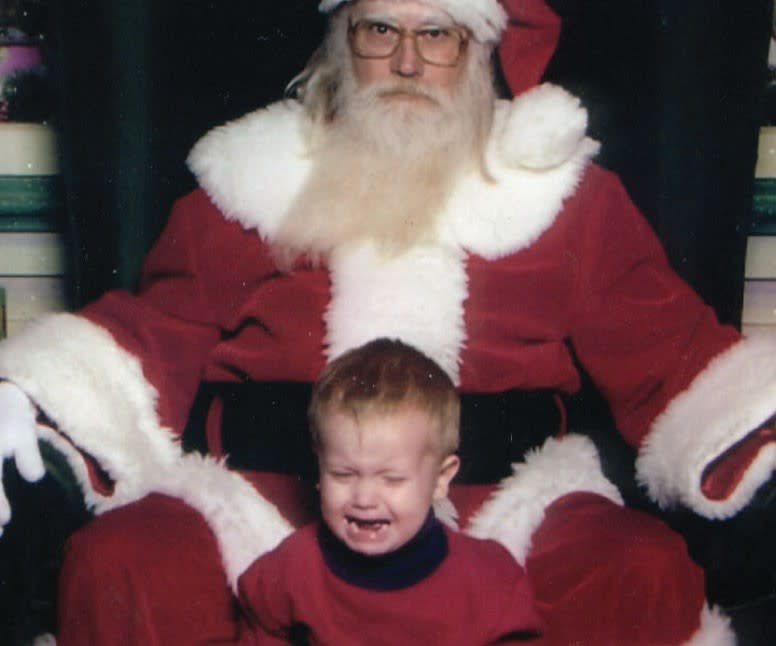What to Do When Your Kid Asks: 'Is Santa Real?'

This article originally appeared on Fatherly:
It’s going to happen one day — your child will come home from school and say that some older kid on the playground told him that Santa wasn’t real. Your first instinct may be to find out where this Son of a Grinch lives and hand deliver him a lump of coal. But that wouldn’t be in the Christmas spirit, would it?
Dale McGowan is the author of “In Faith and In Doubt: How Religious Believers and Nonbelievers Can Create Strong Marriages and Loving Families”, and he was in your spot not too long ago. The best advice is what you intrinsically know: “The appropriate response is to tell the truth,” says McGowan.

Don’t worry, you won’t destroy their sense of childlike wonder. If anything, the fact that they asked means that they’re developing a healthy perspective on reality — so … already a step ahead of Donald Trump!
You Won’t Have to Answer This Question For A While
No 2-year-old wanders up to their parents and asks point-blank if Santa Claus is real. They’ll usually start by asking a lot of questions about the chimney width, flying sleigh physics, and Santa’s shady employment practices.
Eventually their curiosity will lead them to that final need-to-know answer. So, what then? “You reward their willingness to know the answer by giving them the answer,” says McGowan. “What they’re indicating at that point is that they’re ready for it and you should say ‘Congratulations, you figured it out.’”
Can Kids Handle the Truth?
Contrary to what you may think, children are less disappointed with the fact that Santa Claus isn’t real that you may think. McGowan says that kids are usually relieved to know, or excited to be on the inside of this worldwide secret (just like the Lizard People — but you’ve said too much). He’s also found that older kids are good about keeping the Santa secret for younger kids. Because with great yuletide power, comes great yuletide responsibility.

Don’t Propagate The Myth Too Enthusiastically
By all means, leave out milk and cookies for Santa, but don’t start planting evidence for the jolly fat man like you’re the North Pole’s LAPD. “Doing that is more heavy-handed and deceptive,” says McGowan. “That’s when kids can feel betrayed.”
Don’t Threaten With The Naughty List
When McGowan’s daughter started doubting, his son told her that said Santa would leave coal her stocking if she didn’t believe. Sure, as a parent part of you want to use this bit of Santa-lore to keep your child on the straight and narrow. Don’t do it. When your children do find out that there’s no Santa, they’ll feel manipulated. Instead, walk back the whole idea of a naughty and nice list. If your kids are rotten, you’re not going to cancel Christmas. If they’re extra nice, that’s a little creepy. Plus being punished by an all-seeing, all-knowing entity is better left to organized religion.

There’s Room for Believers And Non-Believers
Above all McGowan wants his kids to have empathy for their friends who are still into the whole Santa thing. Just because they’ve moved past it, they should understand it’s alright for other children to continue to believe — just like Cubs fans continue to watch baseball year after year. There are 3 points you can make to your kids about this:
It’s not appropriate to say people are stupid because they believe. “My son said something about religious people being dumb when he was around 9. I told him to run down to the basement to get me a Coke. He said, "By myself? I don’t like to go into the basement by myself.” Even though he knows there aren’t ghosts down there, he recognized an irrational fear.“ Nobody shouldn’t be afraid of no ghost (or is that any ghost?).
Explain that changing beliefs takes time. "There’s a huge amount of comfort in someone that rewards our behavior,” says McGowan. So whether it’s Santa Claus or a Las Vegas blackjack dealer, understand why people hold things close that make them feel good.
Lead by example. McGowan says that if his kids see him being arrogant or obnoxious to people of faith, they’re likely to imitate and be bullies. Allow your kids to see you react empathetically, not scornfully.
Let Them Come To Their Own Conclusions
There are a lot of people who celebrate the holidays who think it’s better not to build up a myth that will eventually just let a kid down. But, McGowan says those children are missing out. “I think it’s a missed opportunity. It’s such a perfect opportunity to find a harmless myth system and find their way out of it.”
(Top gif: 20th Century Fox)
9 New Holiday Classics To Make Bedtime More Festive During Christmas And Hannukah
A LEGO Master Builder On Turning Your Kid Into A Tiny Architect

